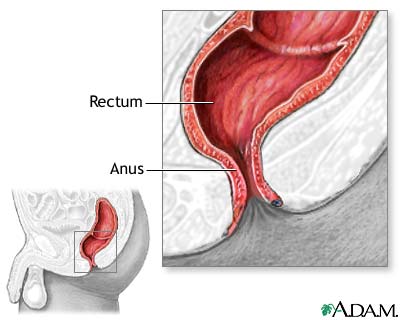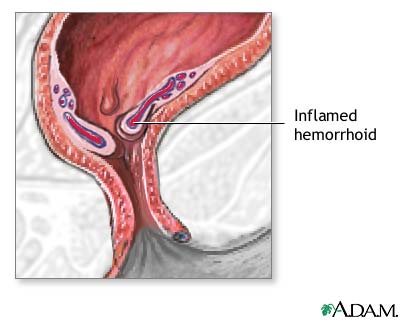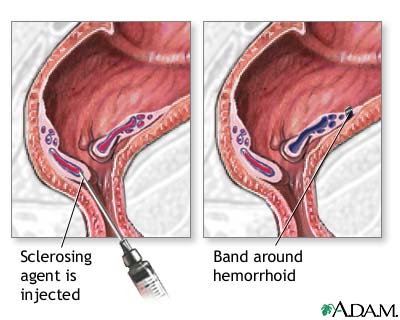Health Library
Hemorrhoid surgery - series

Normal anatomy
The rectum is the final portion of the large intestine. It empties stool from the body through the anus. Hemorrhoids are "cushions" of tissue filled with blood vessels at the junction of the rectum and the anus.

Indications
These vascular cushions can become swollen and inflamed, usually due to increased intra-abdominal pressure, such as during straining when constipated or during pregnancy. Such swelling can cause pain, bleeding, and itching. Hemorrhoid removal may be recommended when non-surgical treatment (fiber rich diet, laxatives, stool softener, suppositories, medications, warm baths) has not provided adequate relief from:
- Persistent itching
- Anal bleeding
- Pain
- Blood clots (thrombosis of the hemorrhoids)

Procedure
The hemorrhoid is ligated at its base, to prevent bleeding from the blood vessels within the hemorrhoid, then it is removed surgically. Alternatively, some surgeons will simply apply a rubber band around the base of the hemorrhoid (banding); deprived of its blood supply, the hemorrhoid will then simply fall off and be passed in the stool. Finally, some surgeons will inject the base of the hemorrhoid with a sclerosing agent (sclerotherapy), which also destroys the vessels in the hemorrhoid, causing it to fall off and be passed in the stool.

Aftercare
The outcome is very good in more than 90% of the cases. The patient may experience considerable pain after surgery as the anus tightens and relaxes. Medications to relieve pain may be used. To avoid straining, stool softeners will be used. Avoid any straining during bowel movement or urination. Soaking in a warm bath can bring additional comfort. Expect complete recovery in about 2 weeks.
Related Information
Hemorrhoid surgeryHemorrhoids
BACK TO TOP
Review Date: 9/9/2023
Reviewed By: Debra G. Wechter, MD, FACS, General Surgery Practice Specializing in Breast Cancer, Virginia Mason Medical Center, Seattle, WA. Also reviewed by David C. Dugdale, MD, Medical Director, Brenda Conaway, Editorial Director, and the A.D.A.M. Editorial team.
 | A.D.A.M., Inc. is accredited by URAC, for Health Content Provider (www.urac.org). URAC's accreditation program is an independent audit to verify that A.D.A.M. follows rigorous standards of quality and accountability. A.D.A.M. is among the first to achieve this important distinction for online health information and services. Learn more about A.D.A.M.'s editorial policy, editorial process and privacy policy. A.D.A.M. is also a founding member of Hi-Ethics. This site complies with the HONcode standard for trustworthy health information: verify here. |
The information provided herein should not be used during any medical emergency or for the diagnosis or treatment of any medical condition. A licensed medical professional should be consulted for diagnosis and treatment of any and all medical conditions. Links to other sites are provided for information only -- they do not constitute endorsements of those other sites. No warranty of any kind, either expressed or implied, is made as to the accuracy, reliability, timeliness, or correctness of any translations made by a third-party service of the information provided herein into any other language. © 1997- 2024 A.D.A.M., a business unit of Ebix, Inc. Any duplication or distribution of the information contained herein is strictly prohibited.
